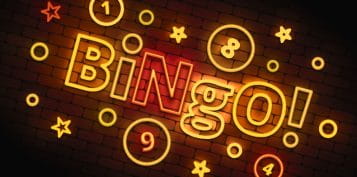Who Invented Dice – A Slice & Dice into the Past
The knowledge about who invented dice is enveloped in mystery and, perhaps, is long lost to our civilisation. The existence of any form of dice can be traced back to the very beginning of our kind, making it a truly fascinating topic. Join us in this blog post as we delve deep into our known history to find who invented the dice.

In this article, we will embark on a journey throughout the centuries to find out who invented the dice. Be prepared that the answer might not be straightforward or clear as many ancient civilisations developed semi-independently for centuries before getting in touch with one another. Keeping that in mind, we will not only try to determine who invented dice but also introduce you to some of the most popular theories.
Who Invented the Dice First – Knucklebones & Spells
In one form or another, dice have existed and been used since the dawn of time, before humans invented writing. However, one is certain, regardless of who invented the dice, the tiny objects had a completely different purpose at first. Not only that but those tiny tokens and symbols did not have the well-known square form that we are used to today, rather, they were quite imperfect.
The earliest dice discovered by archaeologists were most often made out of the talus of hoofed animals and were known as knucklebones. Our distant relatives who invented dice like this were mostly using the anklebones of sheep, buffalo, horses, cows, and other tamed animals, whose bones were easy to find.

Naturally, those precursors of the modern dice had a bone-like shape and did not have numbers on the sides. Instead, primitive people used them for casting of lots to divine the future, pray to the gods, summon mystical beings, and so on. In fact, such crafts that use knucklebones are still used to this day in some parts of the world.
No matter how much we dig into the subject, the exact founder of the dice, just like the one who invented poker, is long lost. That said, in the following section of our blog post, we will look at some of the most popular theories that try to answer the question of who created the dice.
Cultures Who Invented the Dice – A Tour Around the Globe
You might be surprised that some of the earliest transcripts that have survived to this day state, in one way or another, that people used dice. Once again, the small pieces took action in casting magic and communing with the spirits, but it becomes clear people have started using it for games and gambling as well. Let’s look at the listing below and find out the oldest countries, cultures and places where dice were mentioned:
As we said, it would be impossible to name who was the first dice creator, as we will need a time machine for that. However, we could pinpoint where and when some of the oldest dice and dice games were found. Without further ado, let’s get right into it.
Sumer – 3rd Millennium BCE
Undoubtedly, those who have wondered about the earliest inventor of dice have run into the name “Sumer”. This is the name of the earliest known civilisation in the historical region of southern Mesopotamia that appeared and flourished during the Chalcolithic and early Bronze Ages. Some of the world’s earliest proto-writing has been located there, dating from 3000 BCE.
Knowing all that, it is no surprise that the dice have made their way into this ancient civilisation’s life and culture. Proof of this statement is the enormous discovery made by Sir Leonard Woolley between 1922 and 1934. During his excavation expeditions to the Royal Cemetery at Ur, he and his team found five gameboards that date from the 3rd millennia BCE.

Following the discovery, the interesting gameboards were named “The Game of Ur”, and the mystery surrounding the rules sparked a lot of interest in the professional and public audiences. Many wondered what the real origin of the dice game was, while others were more interested in figuring out the rules and if the board was some sort of an ancient gambling game. In 1980, Irving Finkel translated an old Babylonian tablet that explained how the game was played.
Essentially, the game is the grandfather of Backgammon and is played by two players. It has two sets of seven game pieces, similar to those in checkers. One of the players is playing with the black pieces, while the other is taking the white ones. Most importantly, the movements in this game are determined by a set of four-sided, tetrahedron-shaped dice.
Iran – 2nd Millennium BCE
The next pretender for the title “the nation which created the dice” is the ancient Persian empire. About 2-3 millennia BCE, the old Iranians began playing a dice game that is popular today, namely Backgammon. Of course, the game was quite different from the one that we know today, but one is certain, its tetrahedral dice played a massive role in the gameplay.

In the following centuries, many different alterations to the dice game appeared. In fact, games with dice were so deeply imbraided into the Iranian culture that the Persian game of nard is believed to be invented by the vizier of Khosrow I.
Anyhow, regardless of if the Iranians were the ones that invented the dice, they undoubtedly contributed to the development and the wide spread of the dice games. Gambling on dice games became so popular, reaching the point where nearly everyone had thrown a few dice in their lifetime.
Egypt – 3rd – 2nd Millennium BCE
If you believe that you have found an answer to the question about who invented the dice roll, we are sorry to inform you, but we will have to confuse you a bit more. Similarly, to the question of who invented the casino, straightforward answers would be difficult to find here. In other words, if we join a caravan about three millennia BCE and travel southwest, eventually, we will reach the ancient kingdom of Egypt.
There, we will find another old version of dice that seems to have developed separately from Sumerian or Iranian influence. The ancient Egyptian game of Senet, meaning “passing, afternoon”, is a board game dated to 2620 BCE, but older variants can be found from even earlier. In fact, fragmentary boards that could be Senet have been found in Egyptian burials from their First Dynasty.

Anyhow, what is truly amazing about this unique board game is that its “dice” are like nothing you have ever seen. The movement of the pieces in the game was determined by throwing flat two-sided throw sticks that functioned as a form of Egyptian dice. The game of Senet remained popular until the kingdom was integrated into the Roman Empire.
India – 2nd Millennium BCE
Despite listing three great answers to the question “who invented dice”, one could argue that the answer is not among them. The earliest references to board games on the Indian subcontinent come from the Indus Valley Civilisation. Ancient Hindu texts and Sanskrit like Rigveda, Atharvaveda, and Mahabharata mention games involving dice way back into the 3rd millennia.

Recent discoveries proved ancient statements at sites like Harappa, Lothal, and Mohenjo-Daro. The found board games there were dated to be older than 2500 BCE, some of which were etched into the floors of caves and temples.
Surprisingly enough, some of those facilities harboured statues of Ganesha, the Hindu elephant-headed God of gambling. Among the findings were a few perfectly shaped terracotta dice that are identical to the ones we use today.
Greece – 1300 BCE
You might wonder why we are mentioning Greece’s invention of the dice. After all, as you saw from the listing, it was done way after the previously mentioned civilisations. We believe that it is a great honourable mention as none other than the father of history, Herodotus, speaks about it.
Before archaeologists were able to find proof of older dice and games throughout the 20th century, the Western world was more or less sold on Herodotus’ claim. Anyhow, if you had travelled to ancient Greece and asked the father of history about who invented the dice roll, he would most definitely attribute it to Palamedes.

According to Herodotus, during the siege of Troy, as the besieging Greeks were roasting under the hot sun and getting bored to death, the infamous Palamedes invented the first dice, and respectively the first game that goes with it. According to some historians, such tales have set the groundwork for the deep Greek and later Roman gambling culture, which became known for its gladiator and chariot betting.
We cannot know whether that fact is true, but we can trace how Palamedes had a reputation for sagacity. Thus, the ancient Greeks attributed several inventions to him, such as their alphabet, numbers, weights, measures, coinage, multiple board games, and the philosophy of eating at regular intervals. But yet again, we will never be absolutely certain.
China – Circa 600 BCE
It is believed that ancient Chinese invented their version of the dice around 600 BCE, which was quite close to our modern understanding of the item. Just like some of the other cultures we have discussed previously, it is highly likely that some form of dice had appeared even earlier, but we do not know for certain. Nevertheless, China is the birthplace of many cards and dice gambling games, including domino.
Origin of the Word Dice
So far, we traced the dice’s appearance and development and explored some of the most iconic games that came with it. We believe that now is the perfect moment to look at the origin of the word dice. That might give us an idea of how the item had travelled around time and space.
| How Are “Dice” Called in Different Languages | |
|---|---|
| 🔶 Hindi | Paasa |
| 🟩 Greek | Zária |
| ⚪ Latin | Alea |
| 🔷 French | Dé |
| 🔴 English | Dice |
As you can see for yourself, despite the dice being most definitely invented somewhere in the near east, their name did not stick while travelling from one nation to another. Most definitely, there are many linguistic reasons for this, but we will not get into much detail.
What is important to say is that the origin of the word dice/die in the English language comes from Old French. There, similarly to modern French, the word for the item is “dé”. It is believed that “dé” comes from the Latin words for “given” – “datum”, and the past participle of “to give” – “dare”.
FAQ
We did our best to provide accurate and down-to-the-point information regarding who invented dice. We hope that this journey has been as interesting for you as it has been for us. As a grand finale, we would like to present to your attention some of themost frequently asked questions and answer them for you.
Similar Articles


